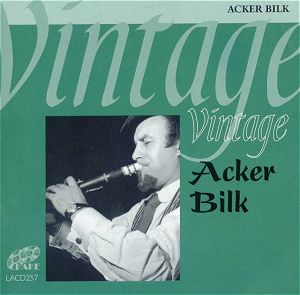All The Girls Go Crazy
East Coast Trot
Franklin Street Blues
Over the Rainbow
Salutation March
Travelling Blues
Breeze
The Old Rugged Cross
Bye And Bye
Dauphine Street Blues
Trouble In Mind
Corrine, Corrina
Over In The Gloryland
Gladiolus Rag
Goodnight Sweet Prince
Careless Love
St. Louis Blues (version 1)
St. Philip’s Street Breakdown
Our Monday Date
Darkness On The Delta
King Joe
Dippermouth Blues
St. Louis Blues (version 2)
Louisian-I-Ay
High Society
Snag It
Sing On
Baby Doll
Redwing
Swing Low Sweet Chariot
Bei Mir Bist Du Schoen
We Shall Walk Through The Streets Of The City
Postman’s Lament
Savoy Blues
Shine
I’ve Found A New Baby
Sweetie Dear
Climax Rag
Delia Gone
Audientor March
Carry Me Back To Old Virginny
Acker Bilk’s Paramount Jazzband, The Storyville
Jazzmen, The Hugh Rainey All-Stars and Johnny
Bastaple’s Chosen Six
This double album, priced
as one, finds Acker Bilk still deeply embedded
in the New Orleans Revival. He had only fairly
recently left Ken Colyer’s Band, and whilst
it’s true that Bilk’s own Paramount Jazzband
had begun to record in 1955, the five or six
months covered by Lake’s conspectus witnessed
a veritable burst of studio recordings.
Whether by accident or design
some of the tracks here have the same kind
of boxy acoustic that was shared by the pioneering
American Music sides made in New Orleans.
It certainly gives – intended or not – an
acoustic verisimilitude to the sides. Trumpeter
Bob Wallis is a strong presence throughout;
he sounds very much like Bunk Johnson on Franklin
Street Blues – vibrato, note placement
et al – though Bilk is the superior soloist,
even if he’s over-recorded in the balance.
Some of Wallis’s bizarre, laryngitic vocals
are included, as well as some stylistically
incompatible work (nanny goat vibrato and
swing phrasing on Careless Love for
instance).
The virtues of these forty-one
tracks lie in their wholehearted embracing
of a genre, in their enthusiasm, and in those
flashes of instrumental excellence that raise
recreative playing to a higher level. But
there is a frenetic element to many of them
that precludes relaxed rhythm – Over the
Rainbow is especially pernicious with
a heavy on the beat approach that saps it
of life. And the attempt at a New Orleans
marching band style on Salutation March
sounds messy if, once again, enthusiastic.
Some of the titles are enlivened by the punchy,
Manny Paul-like alto playing of John R T Davies.
Another fine instrumentalist, Dick Heckstall-Smith
pops up on a couple of numbers – a fine player
but the arrangements aren’t helpful and the
front line ensemble sounds congested.
Hugh Rainey’s group had Ginger
Baker on drums, in the days when Cream was
merely an alternative to milk, not a Supergroup.
He keeps good time though once or twice he
forges out on his own, stylistically speaking.
But of course it’s Bilk who offers the finest
moments, weaving contrapuntal lines with flair,
fine tone and sure harmonic appreciation.
The few instances of rhythmic over-emphasis
are more than compensated for in the variety,
and tonal attractiveness, of his playing.
And his singing, even then, was a much-underrated
facet of his musicianship.
Jonathan Woolf
